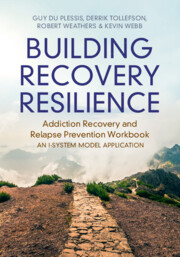 Building Recovery Resilience
Building Recovery Resilience Book contents
- Building Recovery Resilience
- Building Recovery Resilience
- Copyright page
- Contents
- Introduction
- 1 Dealing Effectively with High-Risk Situations
- 2 Coping with Cravings and Triggers
- 3 You Can’t Fix What’s Not Broken
- 4 Break the Addiction Cycle
- 5 The Requirements That Bind Us
- 6 Your Recovery Resilience Practice
- References
- Notes
- Index
2 - Coping with Cravings and Triggers
Published online by Cambridge University Press: 28 May 2024
- Building Recovery Resilience
- Building Recovery Resilience
- Copyright page
- Contents
- Introduction
- 1 Dealing Effectively with High-Risk Situations
- 2 Coping with Cravings and Triggers
- 3 You Can’t Fix What’s Not Broken
- 4 Break the Addiction Cycle
- 5 The Requirements That Bind Us
- 6 Your Recovery Resilience Practice
- References
- Notes
- Index
Summary
It is often stated that cravings are a formidable adversary to those on a recovery pathway and that cravings are one of the major factors related to relapse. Individuals who lack effective coping responses and/or the confidence (self-efficacy) to deal with cravings and the situations that trigger them are at high risk for relapse. In this chapter the authors assist the reader to enhance their ability to manage cravings and highlight that it is a pivotal coping skill needed for their sustained recovery from addiction. In this chapter it is highlighted that a Recovery Resilience Practice supports regulation of both mental and physical health, preserving the inherent resilience of our true self. The theoretical underpinning of the practices is based on the notion that the true self, or our genuine essence, can be reclaimed or further nurtured once deeply entrenched defensive patterns, developed to offset feelings of shame and inadequacy, are consciously recognized, understood, and neutralized. It highlights how these patterns are malleable and can be effectively deconstructed through various means to encourage authentic functioning, characterized by creativity, optimism, spontaneity, and resilience.
- Type
- Chapter
- Information
- Building Recovery ResilienceAddiction Recovery and Relapse Prevention Workbook – An I-System Model Application, pp. 43 - 71Publisher: Cambridge University PressPrint publication year: 2024


